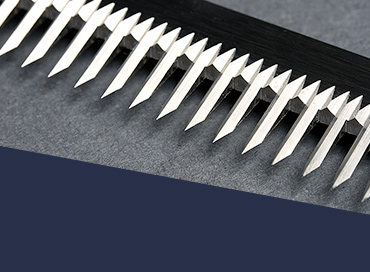Talking Steel
Every month we want to take the opportunity to answer those questions, our customers most frequently ask our team. This month we are looking at differences between steels and their purpose for varying applications.
Here at UK Machine Knives, we know an awful lot about steel. Our HQ’s lie nestled in the industrial heart of Sheffield, where stainless steel was born, and where we have been trading for over five decades. We know good quality steel has a big impact for many of our customers and we pride ourselves on supplying and customising the best quality blades for our customers.
Steels used for processing and packaging blades are enhanced with additional elements, and it is these additions that give different types of steel their special properties and grading, all of which work for you in different ways.
Depending on what your blade is used for, you need to choose a grade of steel that ensures you can achieve the cutting performance you require.
Which grade of steel do I need do I need for packaging?
In the vertical form fill and seal industry, we predominantly supply all our blades in 420 and 440 stainless, depending on the machine build, as well as the customers’ expectations in use. We always aim to match what the customer is currently using, and, if there are issues with the blades they are currently using, then UK machine Knives will provide a better option to enhance the longevity of the parts in some way.
The horizontal industry, is predominantly M2 and M42, as this is the industry standard, but we have worked with some customers using carbide, where they are doing large runs on blades, and down time is not acceptable in their plants.
Which grade of steel do I need for processing?
In the processing industry, in particular, for fish and white meats, we supply in both 420 & 440 stainless. 440 is always the material that we would recommend, as the higher chrome content means there is less chance of the blade picking up particles of rust in an environment where the blade is in contact with moist product, and the machines are washed down at the end of the shift. BUT there are still many customers out there who wish to keep with the standard 420 stainless.
What grades of steel do you offer?
440 b & c stainless
440 b and c are steels in the 440 family. All the 440 steels are considered truly stainless and have the highest corrosion resistance of all steels because they contain the least amount of carbon. This grade of steel would be most commonly used in food processing, and in wet packaging applications, where the machines are routinely washed down at the end of the shift pattern.
420 stainless
420 stainless steel is a martensitic higher carbon version of types 410 and 416 stainless that can be hardened by heat treatment. It contains a minimum of 12 percent chromium, sufficient to give 420 important corrosion resistance properties. This grade of steel would be most commonly used in the vertical form fill and seal industry, or in packaging were the blades are changed out on a regular basis.
D2
Group D steels are high carbon, high chromium. These steels contain 1.5 to 2.35% of carbon and 12% of chromium. They also include 1% Mo and are air hardened. Type D3 steel is oil-quenched, which as a result, tend to be brittle during hardening. Type D2 steel is the most commonly used steel among the group D steels. There is a slight premium for this grade of steel and is most commonly used to increase the life expectancy of a packaging blade.
M2
M2 is a higher carbon version of the M1 steel. The M2 alloy has somewhat better wear resistance than M1. This grade of steel would be most commonly used in anvils for the horizontal form fill and seal industry when wear resistance is critical.
M42
M42 super high speed steel is a premium cobalt high speed steel with a chemical composition designed for high hardness and superior hot hardness. This grade of steel would be most commonly used in for knives and perforators were the blade needs to outperform the anvil.
Solid Carbide
Solid carbide steels have higher levels of resistance to wear, and they can have a long working life. They are also effective when used in longer production runs. These tools are robust in construction and are primarily used for rough and finish turning operations. This grade of steel would be most commonly used in an application where a standard part is being run, and the customer does not want to have his machine stopping to change out his blades. There is a high premium to be paid for this, but on certain occasions the customer feels it is worthwhile.
Do the different grades of steel vary in price?
The price to manufacture the same dimensional part differs depending on the material used. This can be caused by a variety of reasons.
1. The material base price differs
2. The materials differ in the time it takes to machine a fished part
3. Some materials require an element of subcontract process, which is an added price
Here at UK Machine Knives, we guarantee that we will never be beaten on price or quality of steel we provide.
Can you explain the different grade nomenclature?
420
440
D2
M2
M42 etc
UK Machine Knives can provide you with the right solution for any of your applications. If you have any further questions, please feel free to get in touch as we will always be able to provide you with the perfect blade every time.

